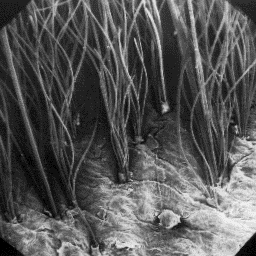 Cricetus cricetus
Cricetus cricetus
-----------------
English: Common hamster
German: Feldhamster
French: Hamster d'Europe
Spanish: Hámster
Distribution areas
------------------
The common hamster is found throughout
Europe and in Middle Asia up to the Yenisei
river.
Description of the fur
----------------------
The skins are from 25 to 35 cm long. The The surface structure
under-fur layer is blue-grey in colour. The of the skin, 40x
coarser hairs and guard hairs are yellow-
-brown with white spots on the sides. The belly is usually dark brown or
black. There are also different mutations of hamster, which are white, yellow,
black or spotted. The grey layer of the under-fur is usually from 8 to 15 mm
long.
|
|
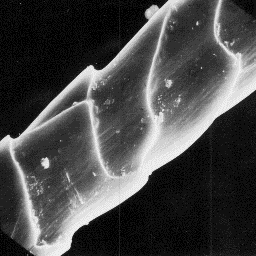 Cricetus cricetus
Cricetus cricetus
-----------------
English: Common hamster
German: Feldhamster
French: Hamster d'Europe
Spanish: Hámster
Structure of the hair
---------------------
The microscopic surface of the skin is
smooth or only slightly rippled and
disturbed. The hair follicles are narrow
and the edges are raised above the skin
surface. There are clusters of 5 to 20
fibres in the follicles.
The cuticular structure
The fine fur fibres are circular in of the fine fibres, 2000x
cross-section, with a diameter of 10 to 25
µm. The cross-sectional outline of some hairs at the upper part is often
ellipsoidal. The pattern of the cuticular scales is cornet-like, and one
section of the edge is moderately elongated. The scale surface is smooth or
in some cases, irregularly grooved. The scale margins are straight. These
fine fibres have a wide medulla, which is unbroken and central
symmetrical-shaped. The overall structure of the medulla belongs to the
uniserial ladder type. The structure of the infilling substance of the
medulla is granular or amorphous.
|
|
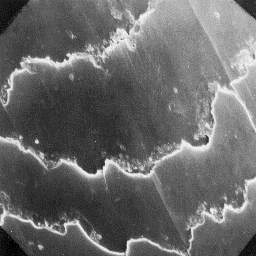 Cricetus cricetus
Cricetus cricetus
-----------------
English: Common hamster
German: Feldhamster
French: Hamster d'Europe
Spanish: Hámster
The intermediate fibres are usually
ellipsoidal in cross-section; the diameter
is from 25 to 55 µm. The cuticular scales
are rounded tile-like in shape, with a
smooth surface and straight margins. The
medulla is wide, central symmetrical-shaped,
unbroken longitudinally, and the structure
is of the fractured uniserial ladder type.
The structure of the infilling substance of The cuticular structure
the medulla is granular or amorphous. of an intermediate hair, 4000x
The guard hairs have a diameter of 60 to 85 µm. The cross-sectional
outline is circular or ellipsoidal. The cuticular scales are of the even
tile-like type with a smooth scale surface and rippled margins. The medulla
is wide, unbroken and central symmetrical-shaped. The medullar column is of
the lumpy type; the infilling substance is amorphous.
|
|
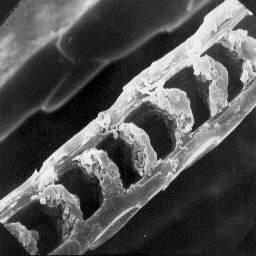 Cricetus cricetus
Cricetus cricetus
-----------------
English: Common hamster
German: Feldhamster
French: Hamster d'Europe
Spanish: Hámster
Longitudinal section
of a fine fur fibre, 2000x
|
|
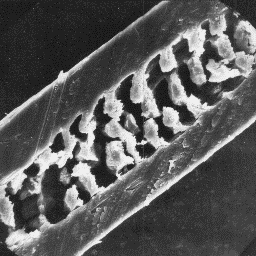 Cricetus cricetus
Cricetus cricetus
-----------------
English: Common hamster
German: Feldhamster
French: Hamster d'Europe
Spanish: Hámster
Longitudinal section
of an intermediate fibre, 1000x
Numerical code for hamster skin structure
-----------------------------------------
Surface of the skin: 1-5-3
Fine fur fibres: 1.2-5-1.3-1-2-1-1-1-6-10.25-5
Intermediate fibres: 18-2-3-1-1-1-1-3.13-6.8-25.55-15.22
Guard hairs: 1.2-2-1-2-2-1-1-13-8-60.85-18.28
|




